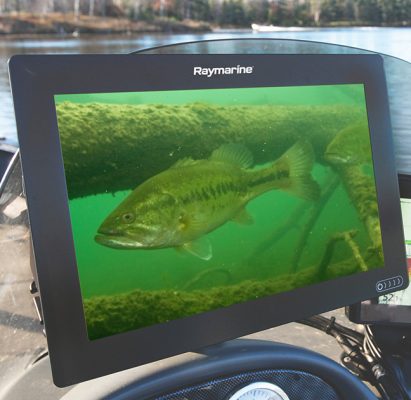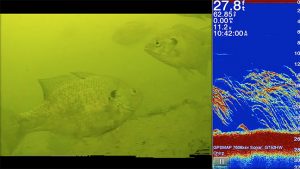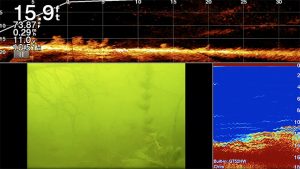What’s Really Down There?
Sonar-compatible Aqua-Vu® HD camera offers live underwater views Somewhere in the mysterious land of sonar menus, hidden windows and secret subroutines lies a little known fish-finding function. Think of it as a super interesting on-screen app that can instantly help you locate and catch more fish.
Rather than a rendered interpretation of fish and structure, live underwater video provides the final word on what lies beneath. As anglers continue to discover, their Lowrance, Garmin and Raymarine sonar-chartplotters offer the powerful ability to connect an Aqua-Vu camera and view live underwater video right on the LCD display.“
Playing live underwater video from my Aqua-Vu camera side by side with sonar is the greatest underwater learning tool there is,” says Kim Stricker, scuba diver and host of the popular show, Hook ‘N Look.

Dr. Bruce Samson, a leading provider of technology-driven education at doctorsonar.com, uses an underwater camera to teach anglers to interpret sonar and to help him find fish while on the water. “No matter how much sonar continues to improve, only my Aqua-Vu provides answers such as species ID, baitfish or crustaceans and types of vegetation with total certainty,” he believes.
For scouting underwater mysteries in clear West Coast waterbodies, bass pro Mark Lassagne concurs. “Connected to my Garmin GPSMAP 8612, the Aqua-Vu Multi-Vu™ Pro HD camera helps take the guesswork out of what I’m seeing on the graph. It’s a quick easy way to add underwater video to your on-board fish-finder.”
On another outing, Lassagne had just caught a 5-pounder off a particular boat dock when he inadvertently swung out over deeper water, noticing some fish-like returns on his sonar. “I dropped the Aqua-Vu and saw a ton of small bluegills milling around just off the dropoff. Seeing this made me understand why the big bass was living on this lone dock. I knew if I let the dock rest awhile, I’d likely be able to come back and find another giant living on it.”
 A school of bluegills explained why big bass consistently occupied a particular boat dock. Beyond on-water discovery, Lassagne says studying underwater imagery also helps him learn and catch more fish after he leaves the lake. “Using Garmin’s ActiveCaptain app, I can record sonar and camera images and video from the graph’s screen right to my phone,” notes Lassagne, an ex-US Marine and current editor of Bass Angler magazine. “It’s fun to share some of these images with friends on social media. Anglers—including myself— never get tired of looking at underwater video.”
A school of bluegills explained why big bass consistently occupied a particular boat dock. Beyond on-water discovery, Lassagne says studying underwater imagery also helps him learn and catch more fish after he leaves the lake. “Using Garmin’s ActiveCaptain app, I can record sonar and camera images and video from the graph’s screen right to my phone,” notes Lassagne, an ex-US Marine and current editor of Bass Angler magazine. “It’s fun to share some of these images with friends on social media. Anglers—including myself— never get tired of looking at underwater video.”
During recent fish-finding missions, Lassagne captured an expansive library of intriguing underwater imagery. The live video, he believes, provides strong visuals that help him interpret the terrain, identify fish species and ultimately put more bass in his boat.
 Multi-Vu HD Pro adds live underwater video right to your sonar screen.“One of the coolest things I identified with the Aqua-Vu was a fish-holding pen on a local California lake,” recalls Lassagne. “I initially saw all these fish and some weird returns on sonar. But it didn’t really make sense until I dropped the camera and saw this 20-foot by 20-foot holding pen loaded with little trout.“
Multi-Vu HD Pro adds live underwater video right to your sonar screen.“One of the coolest things I identified with the Aqua-Vu was a fish-holding pen on a local California lake,” recalls Lassagne. “I initially saw all these fish and some weird returns on sonar. But it didn’t really make sense until I dropped the camera and saw this 20-foot by 20-foot holding pen loaded with little trout.“
Game and Fish biologists put trout in these pens to eventually release into the lake. When trout enter the pens, bass and other species get super fired up. The camera showed me some heavyweight largemouths milling around the outside of the structure, trying to eat the trout. I could see exactly how they were positioned, allowing me to choose the right presentation.“
Once I saw this, I tied on a big swimbait and started catching some really nice bass. Interestingly, when I lowered the camera, I also spotted quite a few squawfish up to about 2-feet long. We occasionally catch squawfish, which also like to eat trout right along with the bass. It’s a pretty cool situation, and one I wouldn’t have fully understood without the camera.”
From a lake-wide perspective, Lassagne says he uses the camera-sonar combination on any new or unfamiliar area. “When I first started using the Multi-Vu camera, it was amazing to see that I’d been wrong in my interpretation of so many spots.

The Aqua-Vu camera shows specific types of vegetation and brush, impossible to otherwise discern with sonar alone.“In several areas, sonar showed these fuzzy looking signals that were difficult to interpret. The camera showed me they were sticks and brush jutting off the bottom. Some of these spots harbored big rocks between the sticks—great cover for crayfish and bass.
In vegetation, you learn just as much; the camera shows you the exact type of grass, its density and all the little ambush and hiding spots for bass.”Rigging a Multi-Vu camera with sonar, says Lassagne, involves an easy connection between the HDMI or RCA video cable supplied with the Aqua-Vu and the back of his Garmin.
For Garmin and Raymarine sonar units, an RCA-to-BNC video is required, while Lowrance offers its own analog video adapter. Camera power is provided by a simple connection to the boat’s batteries.Lassagne’s camera revealed an underwater trout pen that spurred a unique bass-feeding situation.“
The Multi-Vu Pro camera system is a powerful tool for tournament prefishing,” adds Lassagne. “If my sonar marks a fish, I can quickly drop the Aqua-Vu and see if it’s a bass, as opposed to a carp or other species. I can also uncover fish hiding in heavy brush, grass or boulders. But you don’t have to fish tournaments to learn from a camera— it’s just a lot of fun to watch fish in their real underwater surroundings.”
The Original Underwater Viewing System, Aqua-Vu® is manufactured by Outdoors Insight, Inc., and has led the underwater camera category in design, innovation and quality since 1997. The Central Minnesota based company builds other popular outdoors products, such as the iBall Trailer Hitch Camera (iballhitchcam.com).
For more information on Aqua-Vu, visit www.aquavu.com.

